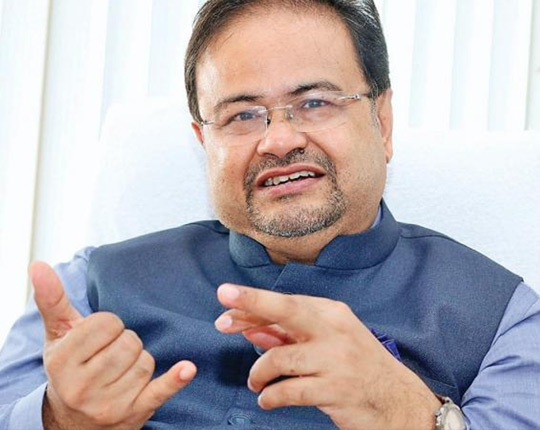Debashis Chatterjee is an Indian academic, author, columnist and management professor, who is currently serving his second term (starting 2018) as the Director of Indian Institute of Management Kozhikode (IIM-K). Chatterjee first served as the Director of IIM-K from 2009 to 2014. IIM-K was the first institute to appoint its own director autonomously after the President Ram Nath Kovind gave assent to the Indian Institutes of Management Act, 2017, on 31 December 2017. The position had been vacant during the period 2014–2018. Chatterjee has over two decades of experience in teaching. He taught leadership courses at various schools including Harvard University, Saïd Business School of the University of Oxford, IIM Calcutta, IIM Lucknow, and IIM Kozhikode. He served as Dean (International Relations) at IIM Lucknow. He also served as the Dean for the Leadership Centre, S P Jain School of Global_Management, Singapore. He served as the Director General of International Management Institute of the three campuses at New Delhi, Kolkata and Bhubaneswar.
Question:IIM Kozhikode received 100% placement this year. What are radical changes that IIM K had undertaken to achieve this?
I believe that one should not look at placement as an event that happens at the end of the year. According to me, placement is a gradual nudging of students towards both portable and transactional skills. Transactional skills being those that one may require when leaving classes to join corporate. So it is important for students to have both- the academic institutions give you knowledge of discipline and industry wants the knowledge of domain- This transition from disciple to domain is what might be called transactional skills.
At IIM K we use the duration of two years in creating that phase. We engage our students in industry dialogues, we invite people from different disciplines and different companies so as to give orientation of different types of industries and world, and this helps them become all rounders. We have Corporate Relation Vice President whose job is to involve organisations and build relationships beyond placement. One more reason to good delivery is that we have a reflective space within the campus, this helps students reflect on course corrections- this keeps them focused and they learn because they wish to!
Question:You say that National Education Policy draft's -online educational programmes is a good move- as you call it value for many not just value for money. But do you think restricting it to a small number as 100 will do justice to the idea of educating a large number?
No, definitely not. You need altruism not just algorithms, to think for the masses is important and to do so one must be sensitive to technologically divided and left alone groups. We were the first IIM to go digital in 2001, after which, IIM Calcutta and IIM Ahmedabad followed- we did it as an answer to our no air connectivity challenge. Likewise, we will have to simplify the process and create technology that is contextually relevant. Technology has to be more intuitive, less based on the knowledge of the user- such online programmes will serve the purpose of needy and marginalized.
Question:Today management courses are very popular in India, yet according to AICTE's data- more than 100 business schools applied for closure. Why do you think this happened, and where are we going wrong?
Let’s look at it fundamentally- there is a fine line between an institution’s belief- business of education or education as business. Now if an institution looks at education as business, it is essentially looking for mere profit and loss, and in this case the institution will be driven by the paradigm of business which focuses on maximizing profit. The 100 B schools that have closed down had to close down as they must not have received the right kind of returns! So if B-schools say that education is the core, and business is the fringe- the way we do in IIMs, closure wouldn’t be required.
I believe that whatever is good for India is good for IIM Kozhikode.
Question:What according to you are the biggest failures or setbacks in the current education system?
There are many systemic setbacks I find in Indian Higher Education Space. Firstly, It is important for us to understand that higher education doesn’t stand for HIRE education- so the fundamental should be to churn our Rishis- Ideators not money makers. Secondly, we have many politicians involved in Higher Education Space- so many decisions are politically correct but academically incorrect. Thirdly, we don’t see the learning, we see the learned. For example- if my daughter does engineering and then wish to do masters in fine arts, as a parent I shall be very disappointed- because we are trained to ignore the process of learning.
As Indians, we have no tolerance for learning. Also, we have obsession for degrees- (the terminal point) but we are very impatient about learning. Other flaw is, our teachers are qualified but not quality rich. We must not forget- every Arjuna needs a Krishna, every Chandragupta needs a Chanakya, every Alaxendra needs an Aristotle- If we want great students, we will have to create great teachers too, which is lacking in our education system right now! Just like IAS (Indian Administrative Service), we should have ITS (Indian Teaching Service)- these teachers should guide the rest in creating the top learning institutions in the country!
"Likewise, we will have to simplify the process and create technology that is contextually relevant. Technology has to be more intuitive, less based on the knowledge of the user- such online programmes will serve the purpose of needy and marginalized.", said Prof Debashis Chatterjee, Director IIM, Kozhikode while having a conversation with Rana Jyoti, Associate Editor, India Education Forum.

